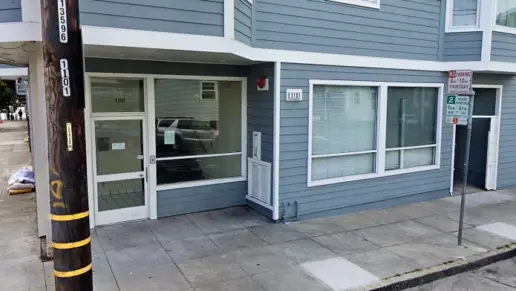About Kings View Community Services
Kings View Community Services, in Hanford, California, provides outpatient mental and behavioral health care for adults. They offer telehealth services, dual diagnosis care, medically supervised ambulatory detox, medication assisted treatment (MAT), general outpatient (OP) programming, and aftercare planning and support. They are a member of the California Association of DUI Treatment Programs (CADTP) and specialize in court-mandated programming.
Kings View Community Services is an outpatient mental health care and addiction recovery facility for adults in Hanford, California providing telehealth care, medically supervised ambulatory detox, medication assisted treatment (MAT), general outpatient (OP) programming, and aftercare planning and support. Dedicated services are available for young adults, justice-involved persons, and persons with co-occurring addiction and mental illness.
Kings View Community Services is a member of the California Association of DUI Treatment (DUI) programs and specializes in court-mandated programming, including drug diversion programs. Court-referred and self-referred DUI and DWI classes are included.
Clients undergoing ambulatory detox receive robust medical supervision and may be prescribed FDA-approved medications to ease withdrawal symptoms and prevent potentially serious complications. Those in alcohol and/or opioid recovery may enroll in their evidence-based MAT program for longer-term pharmacotherapy using methadone and/or buprenorphine.
Their outpatient and aftercare services ensure a complete continuum of care aligned with clients’ evolving needs. Clients receive medical and mental health assessments, drug and alcohol screenings, and personalized care planning. They also engage in intensive individual, group, and family counseling and recovery-focused life skills training. Their aftercare services may include step-down support and referrals for medical, mental health, and social service programs.
Kings View Community Service is accredited by CARF and accepts private insurance and self-pay.
Latest Reviews
Rehab Score
Other Forms of Payment
Private insurance refers to any kind of healthcare coverage that isn't from the state or federal government. This includes individual and family plans offered by an employer or purchased from the Insurance Marketplace. Every plan will have different requirements and out of pocket costs so be sure to get the full details before you start treatment.
Self-pay involves paying for treatment out of your own pocket. You can use savings or credit, get a personal loan, or receive help from family and friends to fund your treatment. If you don't have insurance or your insurance plan doesn't cover a specific program, self-pay can help ensure you still get the care you need.
Financial aid can take many forms. Centers may have grants or scholarships available to clients who meet eligibility requirements. Programs that receive SAMHSA grants may have financial aid available for those who need treatment as well. Grants and scholarships can help you pai for treatment without having to repay.
Addiction Treatments
Levels of Care
Treatments
The goal of treatment for alcoholism is abstinence. Those with poor social support, poor motivation, or psychiatric disorders tend to relapse within a few years of treatment. For these people, success is measured by longer periods of abstinence, reduced use of alcohol, better health, and improved social functioning. Recovery and Maintenance are usually based on 12 step programs and AA meetings.
Drug rehab in California teaches participants constructive ways to stay clean and sober. Treatment revolves around helping individuals stop using the substance they are addicted to and learn healthy habits to avoid relapse.
Many of those suffering from addiction also suffer from mental or emotional illnesses like schizophrenia, bipolar disorder, depression, or anxiety disorders. Rehab and other substance abuse facilities treating those with a dual diagnosis or co-occurring disorder administer psychiatric treatment to address the person's mental health issue in addition to drug and alcohol rehabilitation.
Opioid rehabs specialize in supporting those recovering from opioid addiction. They treat those suffering from addiction to illegal opioids like heroin, as well as prescription drugs like oxycodone. These centers typically combine both physical as well as mental and emotional support to help stop addiction. Physical support often includes medical detox and subsequent medical support (including medication), and mental support includes in-depth therapy to address the underlying causes of addiction.
Substance rehabs focus on helping individuals recover from substance abuse, including alcohol and drug addiction (both illegal and prescription drugs). They often include the opportunity to engage in both individual as well as group therapy.
Programs


Clinical Services
Research clearly demonstrates that recovery is far more successful and sustainable when loved ones like family members participate in rehab and substance abuse treatment. Genetic factors may be at play when it comes to drug and alcohol addiction, as well as mental health issues. Family dynamics often play a critical role in addiction triggers, and if properly educated, family members can be a strong source of support when it comes to rehabilitation.
Group therapy is any therapeutic work that happens in a group (not one-on-one). There are a number of different group therapy modalities, including support groups, experiential therapy, psycho-education, and more. Group therapy involves treatment as well as processing interaction between group members.
In individual therapy, a patient meets one-on-one with a trained psychologist or counselor. Therapy is a pivotal part of effective substance abuse treatment, as it often covers root causes of addiction, including challenges faced by the patient in their social, family, and work/school life.
Amenities
-
Private Rooms
Contact Information
289 East 8th Street
Hanford, CA 93230


